Top 5 SQL Books For Beginners
Get ready to go on a wonderful journey to become an expert in SQL. There are a lot of books out there, and they might make you feel overwhelmed and cause you to suffer from “analysis paralysis.” However, there is no need for you to be worried since we have put together a list of the top five must-read books for SQL beginners. These books will set you on the right path to reaching your goals.
These are not your average dry and boring textbooks; rather, they have carefully created resources that will offer you a good understanding of SQL’s basics as well as its functions. You will discover in-depth explanations, easy-to-follow instructions, as well as practical exercises, all of which are designed to assist you in enhancing your skills and growing in self-confidence. It doesn’t matter whether you’ve never touched a computer in your life or if you’re a skilled expert; if you read these books, you’ll become a coding guru.
Let’s get in and get you started on the path to SQL mastery.
How to Choose a SQL Book?
When you’re just starting out in programming, finding the right SQL book to read might seem like a daunting task. But don’t panic; we’ve got you covered with some professional guidance that’ll have you find the perfect book in no time.
To begin with, it’s essential to take into account your current level of expertise. If you are just starting off, the best place to start is with a book that goes through the basics and lays a solid foundation. Look for an author that not only has expertise in programming in the real world but also has a track record of successfully teaching SQL to other people.
You may also find out if a book is worth your money by reading reviews written by other people who have purchased it. Seek feedback on the text’s readability, structure, and general effectiveness as a SQL book. Last but not least, take into account how you best absorb information. Do you like to learn via experience rather than reading? If you want to put your SQL knowledge to the test, you should look for a book that provides a wide range of different practical tasks and projects. Or maybe you feel more comfortable taking a theoretical approach. Find a book that explores the “why” of SQL’s features and functioning, and get thoroughly familiar with the material included inside it.
What is SQL?
The acronym SQL stands for “Structured Query Language,” and, as the name implies, you are able to use this computer language to ask questions (queries) of databases. SQL is a query language that was developed in the 1970s and is based on the relational data model. Originally, it was known as the structured English query language (SEQUEL). In subsequent years, the word was shortened to SQL.
Oracle, a company that was once known as Relational Software, was the first company to market a SQL relational database management system for commercial use. SQL applications allow businesses and other organizations to access and edit the information and data stored in their databases, as well as to build and modify new tables. In order to have a full grasp of SQL, you need to have a basic grasp of what a database is.
A database is a tool that is used for gathering and arranging the information that has been collected. Databases are able to hold information about everything, including people, products, and orders, among other things. The creation of many databases begins with a word processor or spreadsheet software. Many companies discover that it is beneficial to migrate their information to a database that has been produced by a database management system when their databases grow in size.
Having knowledge of SQL is one of the most desired employment skills right now since so many businesses depend on big data analytics to guide their course of action.
This programming language is most often used for the purpose of facilitating communication with relational database systems. We have the ability to get access to information, retrieve it, sort it, and update it with the assistance of SQL.
It’s used with relational database management systems (RDBMS) like:
- Sybase
- Microsoft SQL Server
- PostgreSQL
- MySQL
- Microsoft Access
- MariaDB
- SQLite
- Oracle
Differences between SQL and MySQL
A lot of beginners may mistakenly believe that SQL and MySQL are identical despite their notable distinctions. SQL, which stands for Structured Query Language, is a standardized language that gives users the ability to create and manage databases. MySQL, on the other hand, is a relational database management system that facilitates data storage and retrieval. SQL is the language that is used by MySQL in order to carry out various operations on the database.
Top 5 SQL Books for Beginners
You will be able to grasp the foundations of Structured Query Language and apply them to real-world scenarios with the help of the selection that we have carefully hand-picked for you, which includes a variety of materials that are of great value.
To assist you in getting started with SQL, each book in our collection has a remarkable one-of-a-kind quality that makes it possible for you to get a new viewpoint as well as access a plethora of information. Because you have access to all of these materials, being a SQL expert won’t be as difficult for you as you may have thought it would be.
SQL All-In-One for Dummies
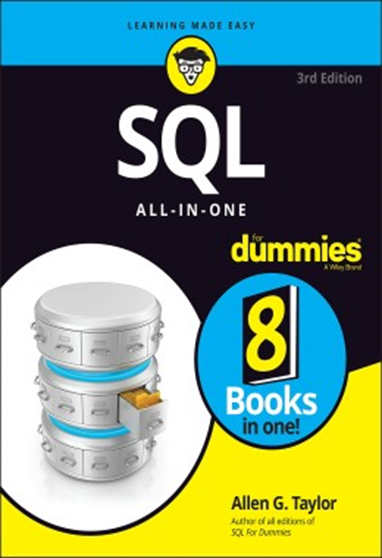
Any beginner who is interested in becoming proficient in SQL should read “SQL All-in-One for Dummies” by the well-known author “Allen G. Taylor.” This book is a must-read. Taylor has written over 40 publications about SQL, and he uses this extensive knowledge to successfully lead readers through the fundamentals of SQL, beginning with the significance of “Relational Database Management Systems (RDMS)”.
This straightforward book covers every detail from query explanations to performance optimization and data security, with the added benefit of introductory knowledge of “JSON and XML.” The authors establish a firm foundation from which readers may confidently advance their SQL abilities.
The days of feeling overwhelmed by numerous SQL concepts are over; “SQL All-in-One for Dummies” explains everything in a clear and concise manner. When readers have finished this book, they will have a comprehensive grasp of SQL and how it operates. This will make it much simpler for them to go on to more complex SQL books while maintaining their self-confidence.
SQL for Data Scientists: A Beginner’s Guide for Building Datasets for Analysis
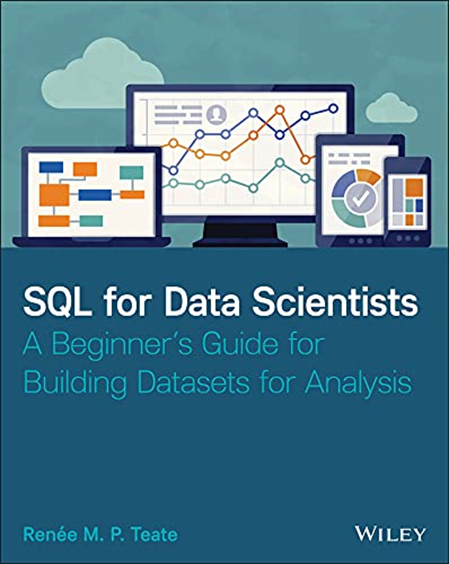
This book, which was released in 2021 and was written by “Rénee M. P. Teate,” a reputable data scientist who is also an author, provides a beginner-friendly but thorough introduction to data analysis using SQL. This book covers fundamental subjects such as “constructing datasets for exploration,” analysis, and machine learning, as well as tips and techniques for creating and building code for data analysis. The explanations in this book are simple and short. This book differs from others in the genre since it focuses narrowly on the SQL skills essential for data science rather than providing a general introduction to the language.
The many examples provided are a big reason why this book has such a high rating on Amazon; they help readers of all SQL knowledge levels grasp the concepts presented.
Practical SQL: A Beginner’s Guide to Storytelling with Data
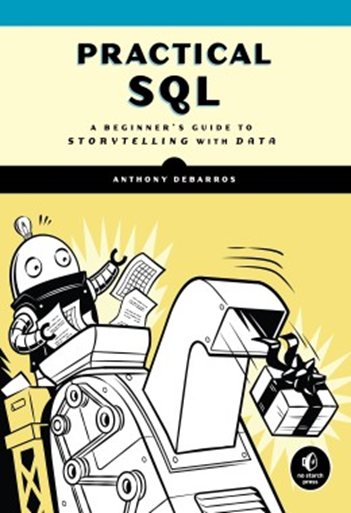
The book “Practical SQL,” written by journalist and data scientist Anthony DeBarros, encourages beginners to “analyze data like a pro” by providing an easy guide to learning the ins and outs of SQL. In this comprehensive book, readers will learn everything from the basics of database creation to sophisticated querying and automation, with an emphasis on discovering hidden secrets in data. In this book, students will learn how to aggregate, sort, and filter data; utilize functions for basic mathematical and complicated statistical operations; spot mistakes and clean them up; analyze spatial data using PostGIS; and more.
In 2018, the first edition of this book was made available to the public. The recently published second edition of “Practical SQL” has up-to-date information on the most recent SQL features, such as data wrangling methods, in addition to two new chapters that are devoted to the process of establishing a system as well as making use of PostgreSQL and JSON. If readers take the guidance offered by DeBarros, an expert in the field, they will be prepared with the knowledge and abilities required to transform raw data into insights that can be acted upon.
Sams Teach Yourself SQL in 10 Minutes
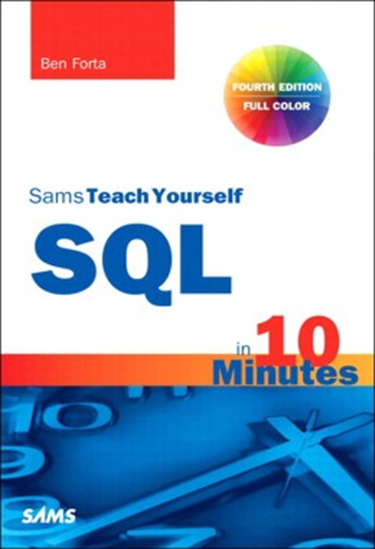
This SQL book is a must-read for people who are just starting out. Ben Forta, a well-known author and expert trainer, saw a need for a beginner’s SQL book that wasn’t geared at DBAs and created “Sams Teach Yourself SQL in 10 Minutes” to fill that void. The focus of Ben Forta is on productivity, and it will assist you in becoming adept in any SQL tool or environment as rapidly as possible.
This book presents the information that you need to know in an approach that is logical, systematic, and easy to understand. You will learn everything from basic data retrieval to more complicated concepts like SQL joins, subqueries, stored procedures, cursors, triggers, and table constraints via a series of 22 lessons that are both simple and straightforward. Additionally, the time required to finish each lesson is no more than ten minutes at the most.
It is not necessary to go through a large number of SQL books intended for beginners since “Sams Teach Yourself SQL in 10 Minutes” is the most efficient and effective method for learning SQL in a short amount of time.
Getting Started with SQL: A Hands-On Approach for Beginners
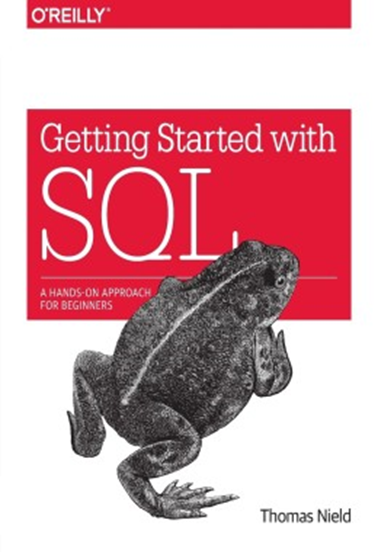
Many SQL books have been produced by O’Reilly, the well-known technology publisher, throughout the years, but Getting Started with SQL is the best place to start. This book is meant to help you grasp the fundamentals in the quickest and most effective manner possible, and despite its short length (just 130 pages), it is both clear and comprehensive. This book introduces SQL in a straightforward and understandable manner by providing hands-on examples and clear explanations. As a result, even those who are unfamiliar with SQL will have no trouble grasping its concepts.
It is not necessary for you to have access to a database server that is already in existence, which is one of the benefits of using this book. Instead, it instructs you on how to create a practice environment at your own house by making use of SQLite, which is not only user-friendly but also quite inexpensive. The book’s first few chapters focus on teaching the reader the core commands for retrieving, sorting, and updating data, while the last chapter delves into more complex issues and includes more learning resources. Getting Started with SQL is an engaging and captivating book that will assist you in developing your SQL abilities and achieving the objectives you have set for yourself. Its plain writing style and practical approach make it a great read.
Is it Possible that SQL will be Eventually Replaced?
Is it possible that SQL will soon be replaced? Even with the introduction of new technologies, it’s quite improbable since SQL gives so many benefits.
- Many data professionals use it, making it an extremely popular tool.
- Relational databases and SQL are essential to the operations of the most successful IT organizations.
- Data professionals have become used to SQL, and it is difficult to retrain them to use different technology.
- SQL is simple to learn, especially for those who have no prior experience in the field of information technology.
- There is a large community that may provide assistance and support for you if you run into any problems when learning SQL or while working with the language.
- SQL is an extremely flexible programming language that can easily adapt to new technological breakthroughs such as artificial intelligence and blockchain.
Conclusion
If you want to improve your SQL skills and get more job offers, all you have to do is read a good SQL book. Spending significant time here will help you become an expert in SQL and advance your career. But it’s not just about employment. Reading a high-quality SQL book is a gratifying experience in and of itself since you will learn new methods, master complicated queries, and get the confidence you need to take on any data-related task.
As you go farther into the realm of SQL, you’ll discover that high-paying job opportunities are well within your grasp. Most SQL experts earn six figures or more, and as your expertise grows, you’ll be in a prime position to get a high-paying job that you’ll love.
Leave a comment